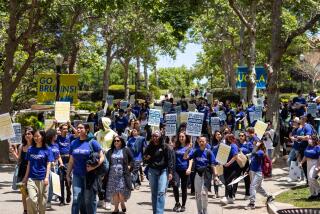Class Schedule Now Includes Porn Film 101
- Share via
Parents: Are your kids in college getting enough pornography? There’s no danger that they’re not if they attend Wesleyan University in Middletown, Conn. In the spring semester, students could take “Pornography: Writing of Prostitutes”; the reading list ran the gamut from the Marquis de Sade to Hustler magazine.
The Hartford Courant bannered the news on its front page, describing one class-related project in which a scantily clad female student bound her wrists with rope and asked others to flog her with a rubber cat-o’-nine-tails. Other schoolwork included a videotape of a male student’s face as he masturbated. Hope Weissman, the professor who taught the course, was upfront: “I don’t put any constraints,” she told the paper. Her challenge to students was, she said, “Create your own work of pornography.” But once the news hit the fan, the school pulled back: “The course is under review,” said Kirstin Fearnley, Wesleyan’s assistant director of media relations, in an interview. And Weissman was unavailable for further comment.
But wait, there’s more. The student newspaper, The Argus, reported earlier this month on a visit to the campus by Annie Sprinkle, the veteran X-rated movie star. In a 2 1/2-hour performance titled, “The Pleasures, Profits and Politics of Creative Sexual Expression,” Sprinkle stripped for the students, performed her trademark “bosom ballet” and then showed a videotape that included excerpts from her movies and also tips on making one’s own porn movie. Evidently, nobody told her that the topic had already been covered in class.
The phenomenon transcends Wesleyan. In 1997, the State University of New York at New Paltz hosted a gathering of sex savants, who listened to lectures on “Safe, Sane and Consensual S/M: an Alternative Way of Loving” and then browsed through exhibits such as “Sex Toys for Women.” The Intercollegiate Studies Institute, a conservative watchdog group based in Wilmington, Del., estimates some 60 colleges across the country teach “pornology.” Indeed, as James Atlas wrote not long ago in the New Yorker, “The pedagogic enshrinement of porn is by now an established fact” on campus.
Why? Atlas argued that the smut surge is a legacy of the 1960s. Campus radicals may have failed to topple the establishment, Atlas maintained, but they took control of their quads. So now, secure in their professorships, if they can’t liberate humanity, they can at least liberate their bodies. The idea, Atlas explained, was that “to unmask our most private, even unacceptable, desire is to unmask the hidden face of repression.” In other words, if aging liberationists can’t overthrow capitalism, they can at least try and overwhelm its bourgeois values. Besides, what’s more fun: picketing the Pentagon or pondering porn? No wonder the campuses are quiet: Students have found something more gratifying to do than protest the killing in Kosovo.
Conservatives inveigh against ivy-indecency, but such complaints only cement tenured radicals in their determination to defend their “transgressive” curricula. Moreover, in the age of the Net, the technical reality is that obscenity can’t be controlled, on or off campus--the cat-o’-nine-tails is out of the bag.
Still, one might wonder what John Wesley (1703-91), the man who gave his name to Wesleyan and also to 17 other American colleges, would make of Weissman’s class, described in the course catalogue as focusing on “regimes of dominance and submission” and of “violation, degradation and exposure.”
Wesley, the founder of Methodism, knew about degradation. But his goal was to uplift it, not revel in it. The Salvation Army was a Methodist group. And as for liberation from forced submission, the Methodists have a distinguished heritage. From his deathbed, Wesley wrote the last letter of his long life to fellow Methodist William Wilberforce, the leader in the fight against the international slave trade: “O be not weary of well doing! Go on, in the name of God,” he exhorted.
The early Methodists found freedom in their faith and then felt the call to free others. Today, schools such as Wesleyan have a much different vision of emancipation. And for now, it probably doesn’t much matter if students are taught to focus on their sexuality and not on their souls. But sooner or later, the unfolding of history flunks the fantasy that freedom and fun are the same thing.
More to Read
Sign up for Essential California
The most important California stories and recommendations in your inbox every morning.
You may occasionally receive promotional content from the Los Angeles Times.












